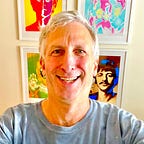THE GREATEST SONGS OF THE 1960s THAT NO ONE HAS EVER HEARD
The Idle Race — The Divine Spark That Lit The Electric Light Orchestra
The Idle Race — “Lucky Man”
The Idle Race transports you to a British music hall via BOAC with a jaunty, loveable sad sack song.
Bruce Eder says that “there’s a certain music hall ambience” to ‘Lucky Man” and David Wells says that the song is a “vaudevillian, oompah-oompah-stick-it-up-your-joompah creation[] that made sense of Lynne’s subsequent claim that the Idle Race were ‘a cross between George Formby* and something or other’.”
The Idle Race and its “cheerfully trippy” (Bruce Eder) first album, ’68’s The Birthday Party, were the divine sparks that lit the Electric Light Orchestra. Of the album (from which “Lucky Man” comes), David Well says that “it showcased the group’s blend of music hall sensibilities, Beatles-ish melodic flair and disturbed flower-child lyrical approach.”
Bruce Eder says:
[The Birthday Party] . . . is a piece of classic British psychedelia that transcends its origins. Most British bands trying to achieve a psychedelic sound in those days simply played softly and sang in a very effete and poetic manner — the Idle Race, by contrast, play hard here and don’t sound effete so much as just cheerfully trippy, a lot like the Beatles of “Penny Lane” and “Strawberry Fields Forever” . . . . Jeff Lynne is the dominant personality here, as composer, guitarist, and singer, and, as one might expect given his presence, the music all has a Beatles-like quality of playfulness amid the musical invention. . . . [T]his album is steeped in beautiful melodies and even prettier embellishments in the singing and playing, yet never loses sight of its rock & roll underpinnings. . . . a great deal of fun, as well as full of little surprises and signposts pointing toward Lynne’s future.
James Turner gives a bit of the history of the Idle Race:
The Birmingham music scene in the early to mid ’60s was incredibly incestuous, and when Roy Wood, guitarist and vocalist with Mike Sheridan and the Nightriders, left to join embryonic Brumbeat supergroup the Move (so named because all members had ‘moved’ to join this new group), the Nightriders found a new guitarist, lost Mike Sheridan and . . . found themselves advertising for a replacement [guitarist] . . . . Eighteen year old guitarist Jeff Lynne . . . was the successful applicant, and . . . the band found themselves putting [him] front and centre . . . . [T]he band’s name evolved from The Nightriders to the more pastoral Idyll Race before settling on The Idle Race, partly because Jeff didn’t want the 9–5 . . . . Jeff [said]“My Mum would come bounding up the stairs, ‘ Come on you lazy bugger, get out, get to work!’ This time she came up, I was holding the sheets down going ‘ Nope, listen, Mum I’ve never got to get up, ever again. I’m a professional musician now ‘ That was the greatest feeling because I was so fed up with (bang, bang, bang) ‘Get up you lazy git!’” . . .
[I] see [the album in] a long tradition of British rock of the ’60s that was influenced by what came before — skiffle, music hall, vaudeville… (The music hall element is something Jeff Lynne would revisit with Roy Wood on the Move songs The Duke of Edinburgh’s Lettuce and My Marge) and so what you get on Birthday Party is a cast of loners, misfits and the underbelly of society. Eleven songs were written by Jeff Lynne, one by Dave Pritchard . . . . The Birthday Party . . . marked the debut of Jeff Lynne as a songwriter and producer of note, and is one of the great lost albums of the late ’60s.
*“English comedian and singer in musical theatre, known as one of the greatest music hall performers of the early 20th century.” (Wikipedia)
See my website at bracefortheobscure60srock.com.
